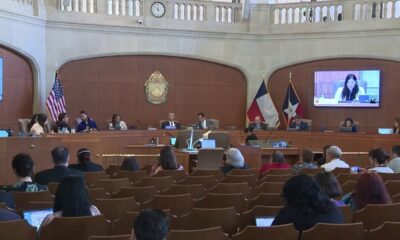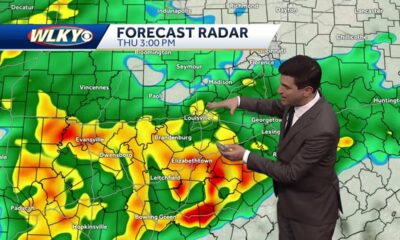News from the South - Virginia News Feed
Political theater takes center stage as legislature returns for veto session
by Markus Schmidt, Virginia Mercury
April 2, 2025
The Virginia General Assembly is set to reconvene Wednesday for what will likely be a long, one-day session that’s equal parts policymaking and political theater, as lawmakers face off over Gov. Glenn Youngkin’s sweeping amendments to 159 bills — including major changes to the state budget.
Youngkin finished acting on all 915 bills sent to him during the 2025 session by last week’s Monday midnight deadline. He signed 599, vetoed 157, and sent back 159 with recommended changes — including a staggering 205 proposed amendments to the budget bill, House Bill 1600, and eight item vetoes.
While many of the vetoes — including on bills to create an adult-use cannabis retail market, raise the minimum wage, allow public-sector unions and tighten how the Virginia Department of Elections processes voter registration data — were expected, none are likely to be overridden. That would require a two-thirds majority in both chambers, and Democrats hold only slim leads: 51-49 in the House, and 21-19 in the Senate.
Governor unleashes veto storm to drown progressive legislation
Instead, the real legislative drama lies in how lawmakers will handle the governor’s amendments — especially those to the budget and several controversial policy bills that set the stage for a partisan clash that could shape not just legislation, but the narrative heading into this fall’s critical gubernatorial and House of Delegates elections.
Stephen Farnsworth, a political analyst from the University of Mary Washington, offered a candid assessment of Virginia’s current legislative dynamics this year, characterizing both the regular and Wednesday’s veto session as exercises in political positioning rather than substantive governance.
“This was a kick-the-can-down-the-road legislative session, and it will be a kick-the-can-down-the-road veto session,” he said.
According to Farnsworth, lawmakers from both sides are focused on shaping narratives ahead of the November elections rather than crafting major policy shifts.
While he expects the veto session to be largely uneventful — “Veto sessions are usually anti-climactic as long as there is general overall agreement on the shape of the budget, and for the most part there is” — he acknowledged that some amendments might slightly nudge legislation in Youngkin’s favor.
One such example Farnsworth pointed to was the governor’s initiative to explore making Oak Hill, the historic residence of President James Monroe in Fairfax County, a state park. He noted the unusual nature of the proposal, given the region’s political leanings and spending patterns.
“Republicans don’t often say ‘let’s spend money in Northern Virginia,’” Farnsworth observed, adding that some Democrats might find the idea more palatable than expected: “There might be some Democratic lawmakers who might say it’s easier to say yes to this than no.”
One example of a proposal that is expected to be caught in limbo, however, is HB 1923, which seeks pay parity for midwives. Rather than sign or veto the bill, Youngkin proposed an amendment requiring the Health Insurance Reform Commission to assess the issue and added a reenactment clause — meaning the bill would need to pass again in 2026 to become law.
Youngkin signs several maternal health bills, tweaks another on unconscious bias training
On the matter of cultural competency and unconscious bias training, Youngkin is once again pushing back. For the second year in a row, he’s offered an alternative to Senate Bill 740 by Sen. Mamie Locke, D-Hampton, and HB 1649 by Del. Cliff Hayes, D-Chesapeake, which would require medical professionals to complete such training to renew their licenses.
As in 2024, Youngkin’s proposed substitute eliminates references to “unconscious bias” and “cultural competency,” replacing them with language focused on serving populations with high maternal mortality and related health disparities. His version also caps the training at two hours.
While Youngkin has expressed support for expanding access to doulas, his amendment to HB 1614 by Del. Adele McClure, D-Arlington, and SB 1418 by Sen. Lashrecse Aird, D-Petersburg, which would allow up to 10 doula visits to be covered by state health insurance, raised eyebrows by changing “birthing people” to “birthing women.”
Supporters argue the original language was meant to be inclusive, since it reflects the fact that transgender and nonbinary people may become pregnant, groups which Youngkin’s edit excludes.
Youngkin also revised HB 2724 by Del. Charniele Herring, D-Alexandria, which regulates the use of automatic license plate recognition (ALPR) technology. While the bill originally limited data retention to 21 days, his amendment extends that to 30 — a modest expansion that still keeps a firm deletion requirement.
The bill strictly regulates how law enforcement can use ALPR data — only in criminal investigations, missing persons cases, and tracking stolen vehicles or wanted individuals — and requires state approval of all such systems.
In the realm of data centers, Youngkin amended HB 1601, sponsored by Del. Josh Thomas, D-Prince William, loosening requirements for environmental and noise assessments.
The original bill required a detailed site analysis before new high-energy -use facilities (HEUFs) could be approved. Youngkin’s version makes that optional for localities and adds flexibility for examining other environmental impacts. He also clarified that the bill wouldn’t take effect unless reenacted in 2026 and wouldn’t interfere with local zoning powers.
Youngkin’s most sweeping changes come in the budget, where he rolled back major Democratic spending priorities.
Youngkin tweaks state budget with eye on federal cuts, but embraces key spending
He also cut $20 million from a proposed rental assistance pilot and removed $15 million designated for a first-time homebuyer grant program. His amendments further eliminate $138 million allocated for school support staff, along with $25 million for HVAC upgrades at Nottoway Correctional Center.
He revived a previously rejected proposal to allocate $25 million for private school scholarships, which would offer $5,000 vouchers to 5,000 low-income families to use toward nonpublic education — a move critics say siphons resources from public schools.
Democrats had proposed tax rebates to return about $1 billion to Virginians. Youngkin pushed instead for structural tax changes, including eliminating the unpopular car tax and exempting tips from taxation — both ideas that were rejected by the legislature.
Still, Youngkin embraced a core Democratic initiative by proposing to make 20% of the Earned Income Tax Credit permanently refundable. Without that change, the enhanced refundability is set to expire in 2027.
He also added controversial language that would withhold state funding from local law enforcement agencies that fail to cooperate with U.S. Immigration and Customs Enforcement (ICE).
Not all of Youngkin’s recommendations were partisan flashpoints. He agreed to send out tax rebate checks — $200 for individuals and $400 for joint filers — and backed bonus payments for public workers. Teachers would receive $1,000 bonuses, while state employees would get 1.5% bonuses on top of their already approved 3% raises starting July 1.
The Democratic majority has the numbers to reject many of Youngkin’s amendments without triggering a budget crisis. Thanks to Virginia’s biennial budget system, state funding is already in place for the fiscal year that begins July 1. However, any budget item rejected by the legislature could still be vetoed individually by the governor.
And Wednesday’s session may not be the last word on the budget. Lawmakers could reconvene later in a special session to address unforeseen federal impacts, such as layoffs or funding cuts, under the terms of a resolution passed earlier this year.
GET THE MORNING HEADLINES.
Virginia Mercury is part of States Newsroom, a nonprofit news network supported by grants and a coalition of donors as a 501c(3) public charity. Virginia Mercury maintains editorial independence. Contact Editor Samantha Willis for questions: info@virginiamercury.com.
The post Political theater takes center stage as legislature returns for veto session appeared first on virginiamercury.com
News from the South - Virginia News Feed
UMD introduces Buzz Williams as new men’s basketball coach | NBC4 Washington
SUMMARY: Buzz Williams has been introduced as the new men’s basketball coach at Maryland after Kevin Whiddler’s departure to Villanova. Williams, known for his success in taking three schools to the NCAA tournament, is focused on building a winning team with strong defensive strategies. Unlike his predecessor, who criticized resource limitations, Williams is confident in the commitment and support he will receive, including resources like NIL deals. The quick hiring process allows Williams to start rebuilding the roster, with a focus on chemistry and key player retention as he navigates the transfer portal.

The University of Maryland introduced the next men’s basketball coach. News4’s JP Finlay reports.
_______
NBC4 Washington / WRC-TV is the No. 1 broadcast television station and the home of the most-watched local news in Washington, D.C. The station leads the market in providing timely and breaking news and information in text, video and graphics across more than 15 platforms including NBCWashington.com, the NBC4 app, NBC4 streaming news channel, newsletters, and social media.
FOLLOW & STREAM NBC4 WASHINGTON
NBC4 News Streaming channel: https://www.nbcwashington.com/watch/
Xumo Play: https://play.xumo.com/live-guide/nbc-washington-dc-news
Roku: https://therokuchannel.roku.com/watch/021707311e0b595597f97a389e0051e6/nbc-washington-dc-news
Also available on Pluto TV, Freevee, Google TV, TCL, Local Now, and Samsung TV Plus.
More here: https://www.nbcwashington.com/watchlive/
Instagram: http://nbc4dc.com/3HxYkYH
Threads: http://nbc4dc.com/ZYZAAHJ
Facebook: http://nbc4dc.com/iD1GvRQ
X: http://nbc4dc.com/APF7vQM
TikTok: http://nbc4dc.com/pg5Nx67
VISIT OUR SITE: https://www.nbcwashington.com/
DOWNLOAD OUR FREE APPS: https://www.nbcwashington.com/products/
WATCH NBC4 LIVE ON AMAZON FIRE TV: https://www.nbcwashington.com/firetv/
WATCH NBC4 LIVE ON ROKU: https://www.nbcwashington.com/roku/d
News from the South - Virginia News Feed
Family files wrongful death lawsuit against Colonial Heights rehab center
SUMMARY: The family of 78-year-old Geraldine Richardson has filed a wrongful death lawsuit against Colonial Heights Rehabilitation and Nursing Center, alleging negligence in her care. Richardson, who had dementia and difficulty walking, died on March 7, 2023, after developing severe pressure ulcers and sepsis during her two-year stay at the facility. The lawsuit claims she was malnourished and suffered unnoticed strokes, with inadequate repositioning contributing to her condition. This legal action follows an ongoing investigation into the facility linked to the death of another resident. The Richardson family seeks over $10 million in damages.

A wrongful death lawsuit has been filed against Colonial Heights Rehabilitation and Nursing Center.
News from the South - Virginia News Feed
Democrats fail to override Youngkin vetoes in largely symbolic showdown
by Markus Schmidt, Virginia Mercury
April 2, 2025
In a dramatic but ultimately symbolic show of defiance, Virginia House Democrats on Wednesday tried — and failed — to override 13 of Gov. Glenn Youngkin’s vetoes from this year’s legislative session, knowing full well the numbers were never in their favor.
Youngkin, a Republican, rejected 157 of the 915 measures sent to his desk by the Democratic-controlled General Assembly in February, flexing his veto pen more aggressively than any Virginia governor in decades.
But with Democrats holding only narrow majorities — 51-49 in the House and 21-19 in the Senate — their chances of reversing any of those decisions were always slim. Overriding a gubernatorial veto in Virginia requires a two-thirds vote in both chambers.
Still, Wednesday’s veto session was less about math and more about momentum in a pivotal election year. With every seat in the House of Delegates on the ballot and a gubernatorial race already underway, Democrats used the day to draw sharp contrasts with the Republican agenda — and with the party’s standard bearer, President Donald Trump.
Nearly every Democratic lawmaker who rose to speak did so with a common refrain, casting House Republicans as “terrified of Trump” and unwilling to stand up for Virginia values — from voting rights and gun safety to fair wages and union rights.
Bid to ban assault-style weapons falls short
While the Senate declined to take up any of the vetoed bills, House Democrats fell short in their attempt to override Youngkin’s veto of a bill restricting assault-style firearms. The 50-46 party-line vote was a setback for legislation central to Virginia’s ongoing gun debate.
House Bill 1607, identical to Senate Bill 1181, would have made it a Class 1 misdemeanor to import, sell, or transfer assault-style firearms, with exceptions for antiques, inoperable or manually operated guns, and those made before July 1, 2025. It also barred those under 21 from possessing such firearms and banned high-capacity magazines.
Del. Dan Helmer, D-Fairfax, a combat veteran and the bill’s sponsor, defended it as a public safety measure.
“These weapons were designed for the battlefield, not for our streets,” Helmer said. “They have no place in Virginia. Our law enforcement officers work tirelessly to keep our community safe … The least we can do is to support them.”
He accused GOP lawmakers of bowing to special interests: “Once again, the Republicans’ priorities are not the priorities of Virginia’s working families. They are too terrified of Donald Trump to act to remove weapons of war from our communities.”
Del. Nick Freitas, R-Culpeper, also a veteran, pushed back, saying the bill would punish law-abiding citizens.
“I also carried weapons overseas in combat situations, and I don’t recall once when I was either conducting combat operations (or) any part in the oath I swore to the Constitution to then be able to come back, sit in this legislature and deprive American citizens of their constitutionally protected rights to defend themselves.”
Protecting voting rights
The House also came up short in an effort to override Youngkin’s veto of HB 1657, a bill that would have required the Department of Elections to complete any large-scale voter roll removals at least 90 days before any primary or general election — a safeguard currently in place only for federal races.
Mirroring SB 813, the measure permitted removals in cases of death, felony conviction, mental incapacity, or at the voter’s request — all allowed under current law. It also would have extended the time registrars have to process cancellations from 30 to 60 days and doubled the response window for voters flagged over citizenship concerns from 14 to 28 days.
“The right to vote is sacred as the cornerstone of our democracy and the foundations of our commonwealth,” said Del. Rozia Henson, D-Woodbridge, the bill’s sponsor. “To have a person’s voting rights stripped away so close to an election is simply something that you cannot fathom.”
Henson added, “Let me be clear, if you are ineligible to vote, you simply cannot vote, but it is also the law that voters cannot be systematically purged at the whim of the governor. Yet time and time and time again, Republicans have shown that they’re too scared of Donald Trump to stand up for our democracy and too afraid to protect the right to vote.”
A similar fate befell HB 2002, which sought to limit local registrars to canceling voter registrations only based on data from the Department of Elections or approved state agencies — unless a voter submitted a written request to cancel their own registration.
The bill also aimed to reinstate protections for active-duty military members, Americans temporarily overseas and their families, ensuring their registrations couldn’t be canceled while they remained eligible.
“In Virginia we believe in fair, secure, and accessible elections,” said Del. Amy Laufer, D-Albemarle, the bill’s sponsor. “We have a duty to ensure that our elections are secure without undermining the fundamental right to vote, and we cannot allow outside influences or partisan games to threaten that sacred right.”
Minimum wage hike fails
An attempt by House Democrats to override Youngkin’s veto of a proposed minimum wage increase also fell short.
HB 1928, sponsored by Del. Jeion Ward, D-Hampton, outlined a phased wage hike — codifying the already-scheduled increase to $12.41 per hour on Jan. 1, 2025, followed by raises to $13.50 in 2026 and $15.00 by 2027.
Ward framed the legislation as essential to working families. “Raising a minimum wage is about people, it’s about families struggling to keep lights on,” she said. “It’s about parents working double shifts to afford childcare. And it’s about the workers who keep Virginia running, but they are still left behind.”
But Republicans pushed back, arguing the bill would backfire on the very people it intended to help.
“What your bill actually does is make it illegal to hire someone at a certain amount,” Freitas said. “There’s no such thing as just one minimum wage, there is always two. There is the arbitrary wage that you set, and then there is $0. And a lot of people are going to end up getting $0.”
He warned that higher wage mandates could eliminate jobs altogether: “You don’t just lift people up to a higher wage.”
Marijuana justice efforts stalls
Another proposal — HB 2555 — which would have offered sentencing relief for individuals convicted of marijuana-related felonies, also failed to clear the hurdle of a veto override.
The bill would have granted automatic hearings to those still incarcerated or under supervision as of July 1, 2025 for marijuana offenses committed before legalization in 2021.
The bill recognized Virginia’s shift in marijuana laws and aimed to provide relief for people still serving time for outdated crimes. But Youngkin, in his veto statement, argued that the bill went too far by potentially benefiting individuals convicted of serious crimes.
“While framed as a measure for non-violent offenders,” he wrote, “this bill would allow sentence reductions for individuals convicted of serious crimes, including those involving fentanyl distribution, sales to minors, and violent offenses where marijuana was a factor.”
He also warned of broader consequences for the justice system. “The proposal places an undue burden on courts, prosecutors, and victims,” Youngkin stated, “requiring hearings even for those whose sentences were enhanced by prior marijuana convictions but were primarily convicted of far more serious offenses.”
Henson, who sponsored the legislation, defended the bill as a matter of justice.
“We came a long way in legalizing marijuana,” he said. “The question is why are they afraid to give someone a second chance?”
“Justice is supposed to be about balance,” Henson added. “We have people convicted of marijuana-related offenses still suffering, even though what they did is no longer against the law. This bill gave a chance to make things right.”
No strengthening of union rights
Lastly, the House was unable to secure enough votes to override the governor’s veto of HB 2764, which would have allowed collective bargaining for Virginia’s public employees.
The measure aimed to repeal the state’s ban on public-sector union negotiations and create a Public Employee Relations Board to oversee the process for state and local workers.
The bill required good-faith bargaining over wages, hours and working conditions, and removed a provision mandating secret ballots in union elections — a change critics said could compromise employee privacy.
In his veto statement, Youngkin called the proposal a major policy shift that would “threaten the funding and delivery of critical state and local services” and cost taxpayers “hundreds of millions of dollars a year.” He also criticized the lack of a funding plan, saying agencies were unprepared for the legal and administrative demands.
Del. Kathy Tran, D-Fairfax, the bill’s sponsor, said the measure was about standing with workers.
“Virginia has an opportunity to lead,” she said. “We can demonstrate that we value our workers … by giving them a seat at the table and (improving) our services.”
YOU MAKE OUR WORK POSSIBLE.
Virginia Mercury is part of States Newsroom, a nonprofit news network supported by grants and a coalition of donors as a 501c(3) public charity. Virginia Mercury maintains editorial independence. Contact Editor Samantha Willis for questions: info@virginiamercury.com.
The post Democrats fail to override Youngkin vetoes in largely symbolic showdown appeared first on virginiamercury.com
-

 Mississippi Today1 day ago
Mississippi Today1 day agoPharmacy benefit manager reform likely dead
-

 News from the South - Alabama News Feed7 days ago
News from the South - Alabama News Feed7 days agoSevere storms will impact Alabama this weekend. Damaging winds, hail, and a tornado threat are al…
-

 News from the South - Alabama News Feed6 days ago
News from the South - Alabama News Feed6 days agoUniversity of Alabama student detained by ICE moved to Louisiana
-

 News from the South - Oklahoma News Feed4 days ago
News from the South - Oklahoma News Feed4 days agoTornado watch, severe thunderstorm warnings issued for Oklahoma
-

 News from the South - Virginia News Feed6 days ago
News from the South - Virginia News Feed6 days agoYoungkin removes Ellis, appoints Cuccinelli to UVa board | Virginia
-

 News from the South - Kentucky News Feed7 days ago
News from the South - Kentucky News Feed7 days agoA little early morning putting at the PGA Tour Superstore
-

 News from the South - Georgia News Feed5 days ago
News from the South - Georgia News Feed5 days agoGeorgia road project forcing homeowners out | FOX 5 News
-

 News from the South - West Virginia News Feed5 days ago
News from the South - West Virginia News Feed5 days agoHometown Hero | Restaurant owner serves up hope








































